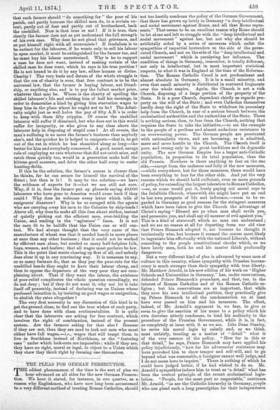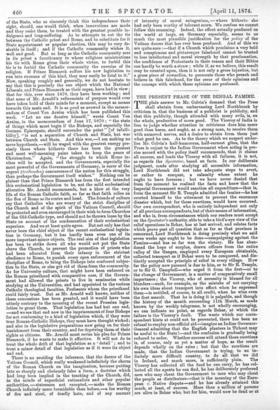THE PLEAS FOR GERMAN PERSECUTION.
THE oddest phenomenon of the time is the sort of plea we hear advanced on all sides for the new German Persecu- tion. We hear it stated, for instance, in one quarter, as a reason why Englishmen, who have now long been accustomed to a very different method of treating Roman Catholics, should
not too hastily condemn the policy of the German Government, that there has grown up lately in Germany "a deep intellectual and social movement against Rome, and all that Rome repre- sents." That seems to be an excellent reason why Rome should be let alone and left to struggle with the "deep intellectual and social movement" against her, but not why she should be artificially aided by a series of measures which enlist the sympathies of impartial bystanders on the side of the perse- cuted Church, and not on the side of the " deep intellectual and social movement " which is paralysing her influence. The condition of things in Germany, remember, is totally different, not only in intellectual, but in most important statistical respects, to what it was in England at the time of the Reforma- tion. The Roman Catholic Creed is not predominant and almost absolute in Germany. It is in a small minority, and even that small minority is distributed in scattered fragments over the whole empire. Again, the Church is not a rich Church, disposing of a large portion of the property of the State. It is a poor Church, dependent chiefly as regards pro- perty on the will of the State ; and even Catholics themselves hardly deny the right of the State to withdraw its pecuniary help from the Church, in case of a serious breach between the ecclesiastical authorities and the authorities of the State. There is nothing serious, then, to fear from the Church, nothing that requires the State to take the initiative,—to set the example to the people of a perilous and almost audacious resistance to an overweening power. The German people are penetrated with rationalistic views, and are becoming, as is admitted, more and more hostile to the Church. The Church itself is poor, and strong only in its great traditions and its dogmatic unity. The new German Empire has a larger anti-Catholic population, in proportion to its total population, than the old Prussia. Nowhere is there anything to fear on the one side,—except from the rashness and folly of the new measures, —while everywhere, but for those measures, there would have been everything to fear for the other side. And yet the very reasons which we should hold sufficient, even on mere grounds of policy, for extending the largest toleration to Roman Catholics, —or, as some would put it, freely paying out moral rope to the Infallible Church, wherewith she might have put an end to her own prospects of life and influence,—seem to be re- garded in Germany as good reasons for the stringent measures which have been taken to give the Church the advantage of Christ's saying " Blessed are ye when men shall revile you, and persecute you, and shall say all manner of evil against you." This is a kind of statecraft which no man can understand ; and we see no reason at all for departing from our old view that Prince Bismarck adopted it, not because he thought it intrinsically wise, but because it seemed the course most likely to ingratiate him effectually with the national Liberals, without conceding to the people constitutional checks which, as we have lately seen, both be and his master think profoundly dangerous.
But a very different kind of plea is advanced by some men of culture in this country, whose sympathy with Prussian bureau- cracy is much stronger than their sympathy with true liberty. Mr. Matthew Arnold, in his new edition of his work on "Higher Schools and Universities in Germany," has, under reservations, defended Prince Bismarck's procedure, and that, too, in the interest of Roman Catholics and of the Roman Catholic re- ligion ; but his reservations are so important, that while they save his own intellectual position, they practically give up Prince Bismarck to all the condemnation we at least have ever passed on him and his measures. The effect, indeed, of Mr. Arnold's argument is, we fear, to give or seem to give the sanction of his name to a policy which his own doctrine utterly condemns, to lend his authority to the procedure of the Prussian Government, while it is, in fact, as completely at issue with it as we are. Like Dean Stanley, he saves his moral logic by calmly and, as we think, most unfairly, treating as a matter of " detail " what is of the very essence of the policy. " How far in this or that detail," he says, Prince Bismarck may have applied his policy injudiciously, "how far his adversaries' resistance may have provoked him to show temper and self-will, and to go beyond what was reasonable, a foreigner cannot well judge, and I do not mean here to inquire." There is nothing of which he could have judged better, if he had wished to do so. Mr. Arnold's sympathies induce him to treat as 'a detail' what has been the central principle of the recent ecclesiastical legis- lation. "People, for the most part so respectable," continues Mr. Arnold, "as are the Catholic hierarchy in Germany, people who can plead such a long prescription for their independence
of the State, who so sincerely think this independence their right, should, one would think, when innovations are made and they resist them, be treated with the greatest possible in- dulgence and long-suffering. As to attempts to cut the tie between the Catholic priest and Rome, and to substitute for it State appointment or popular election, this may be very de- sirable in itself ; and if the Catholic community wishes it, well and good. But so long as the Catholic community sees in its priest a functionary to whose religious ministrations his tie with Rome gives their whole virtue, to forbid this tie is to forbid the Catholic community the exercise of its religion. If Prince Bismarck suffers his new legislation to run into excesses of this kind, they may easily be fatal to it."
Now, speaking roughly and generally, we do not hesitate to say that this is precisely the one object which the National Liberals, and Prince Bismarck as their organ, have had in view ; that for this, ever since 1870, they have been working ; and that none of Mr. Arnold's refinements of purpose would ever have taken hold of their minds for a moment, except as means towards this main end. It is as good as avowed in the memor- andum of Count Von Arnim which has been published this week. "Let no one deceive himself," wrote Count Von Arnim, in the memorandum of June 17, 1870 ; " the state of things which must begin if the Bishops, and especially the German Episcopate, should surrender the point " [of infalli- bility], "is not a separation of Church and State, but war between Church and State. And this war,—I am making no mere hypothesis,—will be waged with the greatest energy pre- cisely there where hitherto there has been the greatest and most well-meaning pains taken to keep the peace of Christendom." Again, " the struggle to which Rome in- vites will be accepted, and the Governments, especially the most powerful of the Governments of Germany, is surer of the urgent (treibenden) concurrence of the nation for this struggle, than perhaps the Government itself wishes." Nothing can be plainer than that Prince Bismarck has from the first intended this ecclesiastical legislation to be, not the mild ecclesiastical alterative Mr. Arnold recommends, but a blow at the very life of the Roman Catholic faith, so far as that faith relies on the See of Rome as its centre and head. The friends of culture say that Catholics who are weary of the strict discipline of the Church and of the spirit of the Vatican Council, should be protected and even encouraged in their wish to form Churches of the Old-Catholic type, and should not be thrown loose by the State on account of the condemnation of their ecclesiastical superiors. And we at least quite agree. But not only has that never been the chief object of the recent ecclesiastical legisla- tion in Germany, but it has hardly been even one of its more important minor objects. The real aim of that legislation has been to strike down all who would not put the State above the Church, to prevent the promotion of priests who had been educated from their infancy in the strictest obedience to Rome, to punish every open enforcement of the discipline of Rome, to bring the Bishops into confessed subjec- tion to the State, or else get rid of them from the community. As for University culture, that might have been enforced on the Roman priesthood with comparative ease, if the Govern- ment had allowed the priests to live in seminaries while studying at the Universities, and had appointed to the various Catholic theological faculties, Professors whom the priesthood could fairly trust. But as Mr. Arnold well knows, neither of these concessions has been granted, and it would have been utterly contrary to the meaning of the recent Prussian legis- lation to grant them. That legislation has had but one end, —and we see that end now in the imprisonment of four Bishops for not conforming to a kind of legislation which, if they were true Roman-Catholic Bishops, they must have thought wicked; and also in the legislative preparations now going on for their banishment from their country, and for depriving them of their rights as citizens. Mr. Arnold must revise his plea for Prince Bismarck, if he wants to make it effective. It will not do to treat the whole drift of that legislation as a detail ' ; and to treat a minor detail of that legislation as if it were its object and end.
There is no avoiding the inference, that the decree of the Vatican Council, which really weakened indefinitely the charm of the Roman Church on the imagination, because putting into so sharply and obviously false a form, a doctrine which had long been implied in the teaching of the Church, did, in the minds of superficial rationalists and other popular authorities, —statesmen not excepted,—make the Roman Church infinitely more formidable than before,—a foe worthy of fire and steel, of deadly hate, and of any amount of intensity of moral antagonism,—where hitherto she had only been worthy of tolerant scorn. We confess we cannot follow this reasoning. Indeed, the effect actually produced on the world at large, on Germany especially, seems to us much the most plausible justification for the policy of the Vatican decree that has ever been produced. And of this we are quite sure :—that if a Church which proclaims a very bold and conspicuous and picturesque falsehood cannot be trusted to lose intellectual and moral strength by that proclamation, the confidence of Protestants in their reason and their Bibles can hardly be worth a straw ; while if, as we believe, this result may be counted upon, then it is not only a gross injustice, but a gross piece of cowardice, to persecute those who preach and believe in this falsehood, for the error of their opinions and the courage with which those opinions are professed.



































 Previous page
Previous page